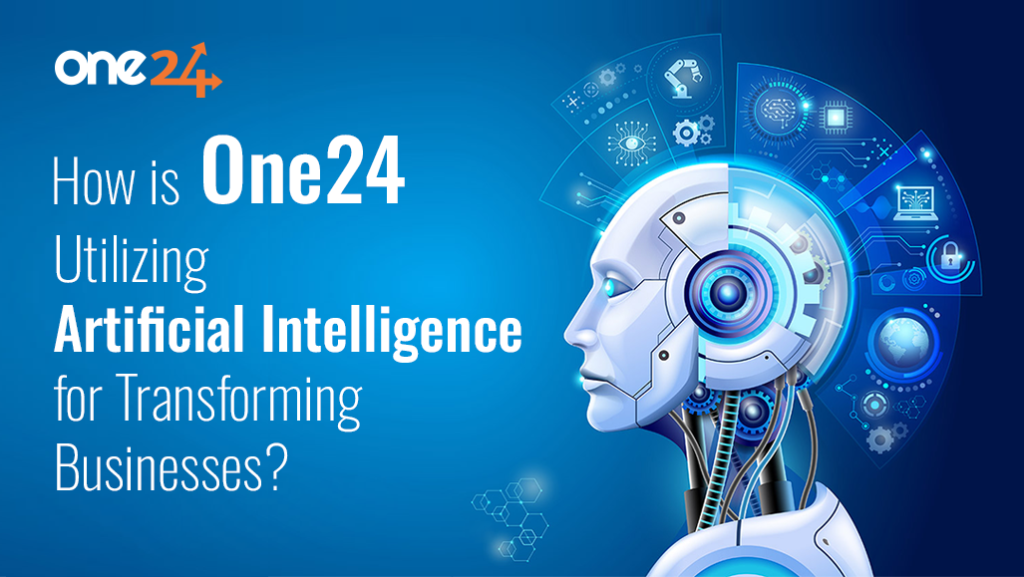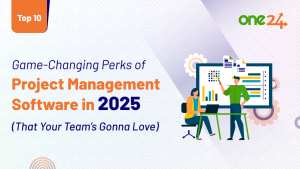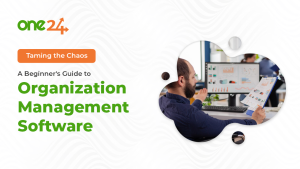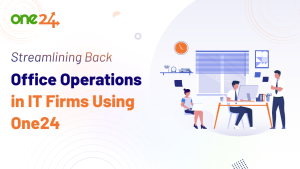Artificial Intelligence (AI) is bringing in previously unheard-of efficiency and insights, quickly changing the face of corporate administration. Organizations can greatly improve their decision-making procedures, expedite operations, and create a more dynamic and effective work environment by utilizing AI. This blog explores the main ways artificial intelligence is transforming business, with particular emphasis on employee 360° evaluation, predictive analysis of individuals and companies, and AI algorithms analyzing project data.

Predictive Analysis of Employees
Using AI in One24 to project employees’ future performance, behavior, and potential is known as predictive analysis in employee management. Organizations can recognize strong achievers, foresee the need for training, and create individualized career development programs thanks to this predictive capability.
- Finding Talent and High Performers: One24 uses artificial intelligence technologies to forecast future performance by analyzing historical data on employee engagement, performance, and other pertinent variables. This makes it easier to identify workers who will probably succeed and others who would want more assistance.
- Reducing Turnover: AI can identify employees who are most likely to leave a firm by examining trends in employee engagement and satisfaction. One24 makes it possible to implement preventative measures to lower turnover rates, including focused retention plans or modifications to working environments.
- Enhancing Training and Development: AI-powered predictive analysis can pinpoint areas of skill deficiency and suggest specialized training courses for staff members. By doing this, the workforce is guaranteed to maintain its competitiveness and ability to adapt to changing organizational needs.
Predictive Analysis of an Organization
At the organizational level, predictive analysis entails applying AI to project future trends, performance, and any obstacles the company may encounter. Making wise judgments that support long-term objectives is made easier with the use of this strategic insight delivered by One24.
- Business Trend Forecasting: Artificial intelligence can forecast future business trends by analyzing market data, industry trends, and internal performance measures. This aids businesses in staying innovative and making proactive strategy adjustments.
- Resource Allocation: By predicting demand and spotting potential underutilization areas, predictive analytics can aid in the optimization of resource allocation. This guarantees the smooth and productive operation of the organization.
- Risk Management: AI can spot possible threats by looking for trends in past data that point to possible problems. This makes it possible for businesses to put risk-reduction plans into action and prevent expensive disruptions.
Employee 360° Evaluation
Feedback on an employee is gathered from peers, subordinates, supervisors, and even external stakeholders as part of the employee 360° evaluation process. With AI in One24, it improves this process by offering more precise evaluations and in-depth insights.
- Comprehensive Feedback: One24 is able to compile and evaluate feedback from various sources, giving employers a complete picture of their workers’ performance. This guarantees impartiality, fairness, and thoroughness of evaluations.
- Strengths and Weaknesses Identification: Artificial intelligence is capable of identifying individual employee’s strengths and weaknesses by examining performance data and feedback. This aids in customizing development strategies to meet the requirements of each individual.
- Increasing Engagement: AI-enabled transparent and helpful feedback can raise staff morale and engagement. Employee engagement and commitment to their roles are positively correlated with the provision of meaningful insights regarding their performance.
Artificial Intelligence Algorithms Analyzing Project Data
Artificial intelligence algorithms are essential for evaluating project data, which enables businesses to streamline project management procedures, enhance results, and boost productivity.
- Project Planning and Scheduling: With AI in One24, it is capable of analyzing past project data to spot trends and forecast the most effective methods for scheduling and planning. This aids in developing resource and timetable strategies that are feasible.
- Performance Monitoring: AI algorithms are capable of continuously monitoring project performance, spotting deviations from the plan, and recommending corrective measures. By doing this, projects are kept on schedule and within budget.
- Risk Prediction and Management: Artificial intelligence can forecast possible risks and recommend solutions for mitigating them by examining project data. By being proactive, delays and cost overruns can be avoided.
Conclusion
Organizational management systems like One24 are being completely transformed by artificial intelligence, which provides unmatched insights and efficiencies. AI helps firms make better decisions, use their resources more efficiently, and develop more engaged and productive workers. Examples of this include predictive analysis of personnel and organizations, thorough 360° appraisals, and sophisticated project data analysis.
Integrating AI into organizational management is not just a fad, but a need. Businesses that use AI-driven management solutions are better equipped to accomplish their strategic objectives, stay competitive, and negotiate the challenges of the modern workplace.
AI’s uses in One24 will only grow as technology advances, bringing with it ever-more-advanced tools and functionalities. Through proactive monitoring of these advancements and the strategic application of AI, enterprises can achieve unprecedented levels of productivity and creativity.
People Also Ask
1. How does AI fit into the administration of organizations?
Through the analysis of massive datasets, trend prediction, and provision of useful insights, artificial intelligence contributes to process simplification, improved decision-making, and increased overall efficiency.
2. How does AI enhance the management of employees?
Through predictive analytics, identifying high performers, lowering attrition, and optimizing training and development initiatives, AI enhances personnel management.
3. In the context of organizational management, what does predictive analysis mean?
By utilizing artificial intelligence to predict future trends, performance, and possible obstacles, predictive analysis assists businesses in making strategic planning and decision-making.
4. How does AI evaluate workers from all angles?
Artificial Intelligence combines and evaluates input from multiple sources to present a thorough and objective assessment of a worker’s capabilities, areas for development, and performance.
5. How does artificial intelligence help with project management?
Through the optimization of planning and scheduling, performance monitoring, risk prediction, and effective resource usage, artificial intelligence (AI) improves project management.
6. How might artificial intelligence lower employee churn?
It recognizes trends in worker happiness and engagement, forecasting potential departing employees and facilitating focused retention initiatives.
7. How does AI help with the distribution of resources?
It optimizes resource allocation by analyzing demand and usage patterns to make sure resources are used effectively and efficiently throughout the company.
8. How does AI help with organizational risk management?
By examining past data and trends, AI detects possible threats, enabling businesses to take preventative measures to reduce risk.
9. How important is AI for predicting business trends?
To forecast future business trends and help firms remain competitive and adjust proactively, AI examines market data, industry trends, and internal metrics.
10. Could AI raise worker morale?
Indeed, AI can improve engagement by offering individualized development plans and open, constructive feedback, which will increase commitment and motivation.
11. How are project data analyses using AI algorithms done?
These systems examine both past and present project data to spot trends, enhance planning, measure progress, and anticipate hazards—all of which help to keep projects on schedule.
12. How does AI affect the procedures involved in making decisions?
This technology offers forecasts and insights based on data that improve the precision and efficacy of organizational management decision-making processes.
13. How might AI help with thorough feedback in employee assessments?
It compiles and evaluates input from several sources to offer a comprehensive and impartial evaluation of a worker’s performance.
14. What are the long-term advantages of incorporating AI into management systems for organizations?
Long-term advantages include increased productivity, better resource allocation, more employee engagement and performance, and more precise strategic planning.
15. Is it economical to use AI in organizational management?
This technology is cost-effective due to its long-term efficiency, enhanced decision-making, and productivity improvements, even though its initial adoption could need financial investment.






